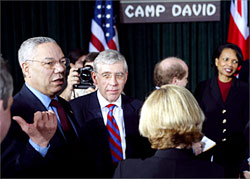UN, EU and Russia excluded from peace process
The Bush Administration is finding increasing support from the Senate and Congress to ignore other major players involved in the Israel-Palestine peace process
Amid bitterness over European opposition to the war in Iraq and wrangling over reconstruction, the Bush administration is finding mounting internal support for their policy of edging the European Union, the United Nations and Russia out of the Israeli-Palestinian “road map” peace process they helped create.
This is not a new political tack, even last September when the UN, EU, US and Russia met supposedly to organize an international peace conference on the Israel Palestine crisis, the US showed little interest.
One UN official commented at the time “If anything, the US is backpedaling, after all, the International Conference was their idea, but don’t seem in any hurry to have it now. The idea that you need to promise anything about Palestine to get Arab cooperation seems to have gone out of the window.”
 |
|
Secretary of State Powell sees peace |
Secretary of State Colin Powell and Bush even now repeatedly fail to mention the other three major players in the peace process, emphasizing that the United States will release the peace plan as soon as the Palestinian legislature confirms a new Palestinian Cabinet under Prime Minister-designate Mahmoud Abbas, widely known as Abu Mazen – but with the caveat that Palestinian attacks on Israelis would make it “almost impossible” for US mediation to bring about progress on the plan.
President Bush said he expected the Middle East peace process to “accelerate and hopefully, greatly” and that he would invite Abu Mazen, but not Palestinian President Yasser Arafat, to the White House.
“I don’t want to spend a great deal of time arguing about the details of the road map. I want to see both sides, in a spirit of cooperation, in a spirit of peace, with the earnest desire to move forward, to start performing,” said Powell, assuming that the UN, EU and Russia would agree with this view point.
A majority in Congress has already been organized to sign on for a lobbying campaign to limit the role of Washington’s three Quartet peace plan partners, seen by many of Israel’s supporters as biased in favour of the Palestinians. Such is the belief in the cause, that US bias in favour of Israel is not considered for the moment.
It may be hard for President Bush to resist the pressure from the Jewish-American lobby in the run-up to next year’s election, even the so called opposition to the Republican Administration walk in sync with the policy.
“It’s not a collective knock at the Quartet. But there is growing disdain for those other parties based on Iraq,” one senior Democrat congressional aide said.
Bush plans to unveil the plan, with its goal of creating a Palestinian state by 2005, following the confirmation of a new Palestinian cabinet.
Eighty-three senators and 278 members of the House of Representatives have signed letters already, criticizing efforts to pressure Prime Minister Ariel Sharon to make concessions until the Palestinians do more to fight terrorism, a campaign orchestrated by the America Israel Public Affairs Committee (AIPAC).
Representatives and Senators are also warning Bush against giving the United Nations, the EU and Russia a “meaningful role” in monitoring the peace plan, which envisions a range of measures including a halt to Palestinian violence.
“The United States has developed a level of credibility and trust with all parties in the region which no other country shares,” according to the House letter, which will be sent to Bush after he releases the plan.
“We are concerned that certain nations or groups, if given a meaningful role in monitoring progress made on the ground, might only lessen the chances of moving forward on a realistic path toward peace,” the letter added.
Former House Speaker Newt Gingrich, a Pentagon advisor, condemned the Quartet earlier this week as “a deliberate and systematic effort to undermine the president’s policies procedurally by ensuring that they will consistently be watered down and distorted by the other three members.”
Many of Israel’s US backers see the EU and the United Nations as too biased toward the Palestinians to play a role in the process. Referring to the well known schism in the Bush administration between the moderates and the neo-conservative hawks, Judith Kipper of the Brookings Institute observes “there’s no doubt about who’s in charge. He [Bush] is closer to the Cheney, Rumsfeld and Wolfowitz point of view.”
“Europeans have a long history of anti-Semitism and anti-Zionism, and the United Nations has consistently demonstrated its bias against Israel, and neither party will serve the interest of peace,” one pro-Israel lobbyist said.
Ari Fleishcer insists that “the future of the road map is up to Israel and the Palestinians. Those are the parties that will determine the acceptance of the road map” – but only under the watchful eye of the US neoconservative administration that is more in stride with Ariel Sharon’s policies than any previous US Government.